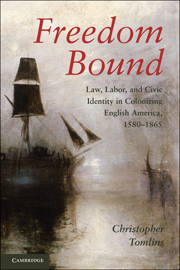Book contents
7 - Changing
Localities, Legalities
Published online by Cambridge University Press: 05 June 2012
Summary
The colonist will avail himself of his cultural heritage whether this has to do with religion, with law, or with methods of farming … Instead of comparing the English common law with the legal monuments in the colonies, our task now becomes inevitably more complex. It is necessary for us to determine what was the cultural heritage of the first settlers, and in what form this heritage first expressed itself in the new land.
Julius Goebel, “King’s Law and Local Custom” (1931)By now it should be clear that rather than planting a template of “English” law, the inside story of English colonizing is one of successive seedings of mainland North America with a plurality of legal cultures, each expressing the designs of projectors but also heavily influenced by migrants’ regional English origins. In the case of the legal culture of work and labor, surveying and comparing local legal practices takes us beyond their distinctive regional origins to the question how the wide range of work practices and authority relationships routinely present in different mainland communities were accommodated and how disputes presented to their courts were adjudicated.
Examination of local legal practice confirms the hypothesis that the labor of colonizing was a highly variegated social activity, performed by highly segmented populations. When it comes to the performance of work and labor, however, historians have represented the role of colonial courts as one reflective more of uniformity than variety. The legal culture of work was primarily an exercise in the reinforcement of coercion. At bottom, all labor was legally unfree because all performances were coerced. This representation is not justified. It is certainly true that the criminalization of resistance to work discipline (notably departure) was an essential feature of the mainland colonies’ regimes of servitude. But servitude had its institutionalized protections as well as its disciplines, as the statutes of different regions have already shown, and courts played a significant role in protecting as well as in coercing. Second, and more important, as both actual numbers (Chapter 1) and the statutes themselves (Chapter 6) indicate, mainland labor was far from uniformly unfree. That is confirmed by this chapter’s study of local practices. In numerous litigated disputes arising from work relationships, one finds civil not criminal procedures uppermost, the courts’ role one more of mediation than coercion.
- Type
- Chapter
- Information
- Freedom BoundLaw, Labor, and Civic Identity in Colonizing English America, 1580–1865, pp. 296 - 332Publisher: Cambridge University PressPrint publication year: 2010



